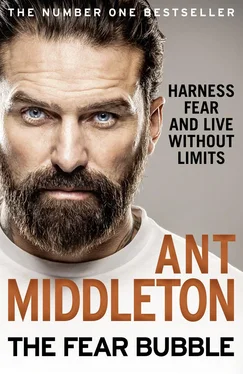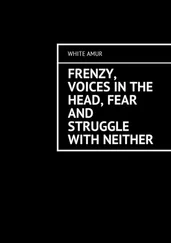On Everest there had been one fatality for every sixteenth person to have successfully climbed it. But I liked those odds. As I lay back on the pillows of my huge hotel bed, in my warm, fluffy hotel dressing-gown, licking Buffalo sauce off my fingertips in preparation for another sip of my nice Shiraz, one in sixteen didn’t seem like anything to worry about at all.
And then, on a dull and rainy English spring morning, I found myself packing my luggage into the back of a taxi and going through the ritual of kissing my family goodbye. As I slammed the boot of the cab shut, my two-year-old daughter Priseïs, clinging on to her favourite pink mouse-ear backpack, suddenly burst into tears as she registered that Daddy was going away somewhere for a long time.
‘I know, I know, I know, baby,’ I said. But I couldn’t calm her.
As my car swung out of the centre of Chelmsford I switched on the little camera that I’d been given to film my journey and pointed it at my face. ‘It’s never nice saying goodbye. I’m just going to dwell on it for a couple of minutes. Get it out of my system and then get my head in the game.’
I turned the thing off and looked out at the wet trees and the grey motorway. I was close to tears.
But by the time I was pushing up my tray table to prepare for the landing at Kathmandu’s Tribhuvan International, that familiar bittersweet sadness was long gone. I was about to alight in a brand new country, one of my most favourite little pleasures. There’s not much else that can fill me with such simple childish delight as the sight of an airport sign spelled out in an unfamiliar alphabet.
When I’m in a foreign land it always feels as if the chains have been taken off, especially these days, when it’s becoming increasingly hard for me to move about unnoticed. Stepping off the plane in my grey T-shirt and jeans, I could feel the drop in temperature and sense the thin air. A fizz of enthusiasm bubbled up as I walked through the brick building, past adverts for the Everest Bank, and hustled my way impatiently through immigration and then customs. I entered the noisy arrivals hall, weaving my trolley laden with my three bags of kit past endless leather-jacketed men calling, ‘Taxi, taxi, do you need a taxi?’, and was met by a fixer from Madison Mountaineering, who was holding a little board with my name on.
‘Welcome to Kathmandu, Ant!’
Part of the deal for agreeing to have my expedition filmed was that I wasn’t going to do it in the luxury style at which Madison, in particular, excelled. Any normal commercial expedition up Everest involves a large team of people led by Western guides and supported by teams of local Sherpas, who all work with between ten and twenty clients at any one time. As you’d expect, these companies can and do ply their trade with safety as a top priority. One of the biggest dangers on Everest concerns the many problems that come as a result of the lack of available oxygen. This is not just an issue in the death zone. People can fall sick, become confused and make perilously bad decisions even down at Base Camp, which sits at over 5,000 metres above sea level, where there’s 50 per cent less oxygen in the air than in the lowlands.
To try to combat this, Westerners are taken up the hill slowly. When you’re ascending from sea level to nearly the cruising altitude of a jumbo jet, you need to allow your body to become used to the conditions as gradually as possible. This is why climbers use a system of ‘rotations’ to acclimatise. Having first done the long trek to Base Camp, where they can stay for two weeks or more, the rotations start with the ascent from there to Camp I, where they stay for two nights. Then it’s a couple of nights in Camp II and then back down to Base Camp again. The second rotation is the same, with the addition of Camp III. It’s pretty standard to complete a third rotation. And then, finally, you get to do the summit rotation.
That sounded like a lot of hassle to me. I didn’t think I could be bothered to complete three rotations only to have to start all over again from Base Camp to get to the top. I decided I’d see how I felt when I got on the mountain, but I honestly didn’t feel the need to be as careful as all the other Westerners. I wasn’t there for my health and safety.
And there were also some other ways in which I intended to do my climb differently to most. I made it clear to Madison Mountaineering that, as far as possible, I’d be my own boss. While they would take care of all the general organisation, and I’d stay in their camps and make use of their supplies of food, drink and oxygen, I wasn’t going to be chucked in with all their wealthy clients. I didn’t want to be part of any tour group. I also refused the help of their Western guides. My expedition was just going to be me, a Sherpa, Ed to film us and another Sherpa for him. And unlike all the other fresh-faced visitors, I wasn’t going to rely on Sherpas to lug my stuff up the hill. Westerners are sometimes guilty of viewing the locals as little more than mules – I wasn’t going to be one of them, and I would carry my own kit.
‘Your Sherpa’s outside waiting to meet you,’ said Madison’s American fixer, trying to take my trolley off me so she could push it. ‘His name is Dawa Lama. And your cameraman Ed’s here too.’
‘Thank you,’ I said, politely but insistently pulling my trolley back.
As soon as I left the airport building I clocked Ed. He was walking towards me with his large camera held at chest height and his headset on. I’d heard that this tall Scottish hard-man was an alpha, and he certainly appeared to be a very capable individual. He was six foot five, lightly grizzled and looked to be in his forties. He was fit and lean in his untucked shirt, black trousers and hiking boots. I realised it was important that our relationship struck the right balance from the outset. I knew, from sore experience, that having two alphas working closely together could be difficult, and it usually requires some precise handling. A couple of days earlier he’d called me so we could make our final arrangements to meet and begin the process of getting to know each other. When I answered the phone, he said, ‘I’m on Ben Nevis.’ Obviously it was necessary that he called, but why do it from the highest mountain in Britain unless you’re making a point? He seemed like a decent and smart guy when we chatted, but that phone call had put me on slight alert. I thought, ‘Let’s see how this pans out.’
Although I was happy to meet Ed in the flesh, as soon as I saw his camera pointing at me I felt my heart sink. It wasn’t the fact of the camera itself, it was all the attention that being filmed naturally draws towards you. You become instantly highlighted. Lines of blue-uniformed policemen stared at us, as did all the porters, drivers and tourists who were milling about the busy airport parkway. I could see them squinting at me thinking, ‘Who in the hell’s that?’ It was a sudden reminder of the compromise I’d made in allowing this thing to be filmed. If I’d arrived alone, as planned, I’d have been feeling utterly free and joyful right about now.
As I approached the smiling Scotsman, I had to give myself a little pep talk: ‘This is my thing. He’s following me up a mountain. I’m not going to let him take my trip over and turn it into a “show”.’ I made a promise to myself. My attitude towards Ed was always going to be, ‘Follow me. If you get your footage, you get it. If you don’t, you don’t.’
‘How you doing, mate?’ I said, shaking his hand. ‘You good?’
‘Yes, mate,’ he said. He fixed me with a slightly quizzical look. ‘Do you realise what you’ve got yourself into?’
That got my guard up. In his own subtle way it seemed that Ed was instantly questioning my ability. The skill set involved in being a member of the Special Forces is a lot different to what’s needed by an elite mountaineer, and he knew it. Not only that, but since our chat on the phone the other day he knew I’d only ever been as high as 6,100 metres above sea level. That’s pretty high, but it’s not Everest. The whole situation threatened to put me on the back foot immediately. I could tell that Ed was extremely sure of himself and didn’t take any shit. He’d be an easy guy to get on with if he respected you, but he didn’t suffer fools. Quiet worries crowded in on me: ‘Am I going to have to live up to his standards? Am I going to have to follow him up to the summit?’
Читать дальше









![John Bruce - The Lettsomian Lectures on Diseases and Disorders of the Heart and Arteries in Middle and Advanced Life [1900-1901]](/books/749387/john-bruce-the-lettsomian-lectures-on-diseases-and-disorders-of-the-heart-and-arteries-in-middle-and-advanced-life-1900-1901-thumb.webp)


